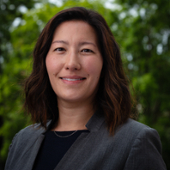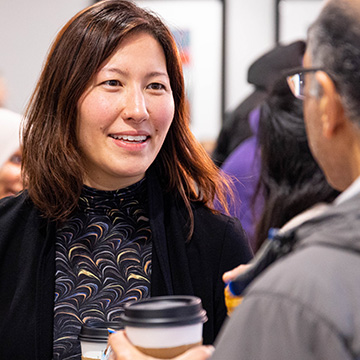Northwestern pushes the research boundaries, so to make time for learning and bringing service to a service excellence standard, we need to be able to define what we are doing and the potential for what can be done.”
Colleague Connection
Jackie Milhans
Director, Research Computing and Data
 Jackie Milhans is the director of research computing and data. She joined Northwestern in 2013 when then-named Research Computing Services was in its infancy. Now, the team supports nearly 6,000 researchers from all disciplines and in many capacities, including the Quest high-performance computing cluster, the Research Data Storage Service, cloud storage, computational workshops, trainings, and boot camps, and research project support.
Jackie Milhans is the director of research computing and data. She joined Northwestern in 2013 when then-named Research Computing Services was in its infancy. Now, the team supports nearly 6,000 researchers from all disciplines and in many capacities, including the Quest high-performance computing cluster, the Research Data Storage Service, cloud storage, computational workshops, trainings, and boot camps, and research project support.
Recently, Jackie received the EDUCAUSE Rising Star Award for her cross-organizational work to promote collaboration and support faculty and student researchers, her commitment to improving diversity among IT teams at her institution, and her many contributions to the EDUCAUSE community.
We caught up with Jackie to learn more about her involvement in EDUCAUSE and its impact on her role at Northwestern. We also discovered a few personal tidbits along the way.
What are some takeaways from your involvement in EDUCAUSE?
The first time I attended EDUCAUSE, I saw hundreds of people motivated to transform and improve higher education IT. Connecting with these individuals was inspiring, as they were striving to offer services that meet the needs of the current student, faculty, and staff populations in their institutions, transforming the workplace to be more inclusive and making people feel like they belong, and improving diversity by bringing new backgrounds and skills into the workforce. I found this supportive philosophy around the desire to lift every single person who is looking to improve or seeking a new opportunity extremely encouraging and affirming to be around.
I also had the opportunity to serve on committees with CIOs, where I learned how they spend their time and where their organizations place their efforts. It was eye-opening to hear the types of issues they face, what they have accomplished, and how they provide opportunities for their institutions.
How do you bring this excitement back to your team?
Creating a culture of celebrating, praising, and encouraging professional development has been key to the success of our group. One of the things we tell people who join our team is that the responsibility of supporting research and being in IT requires constant learning, understanding the environment, and evaluating the types of services you are providing.
It’s also about setting expectations to implement what you learned to improve the way you work, how you interact with people, or to improve the services we provide. Additional importance is placed on valuing and encouraging them to take the time and make space for learning professional and technical skills.

What is the next big thing for supporting Northwestern researchers?
Northwestern pushes the research boundaries, so to make time for learning and bringing service to a service excellence standard, we need to be able to define what we are doing and the potential for what can be done.
Two areas of focus for our team are to make sure our foundational services—documentation, training, compute resources, and data storage—are at a level that meets or exceeds our peer institutions and to expand our services in ways that make sense for Northwestern. The rules, regulations, and compliance for federally sponsored research are becoming more complex. In the area of data management, for example, we are clearly defining our services and providing researchers with resources to make their lives easier.
We are also thrilled to expand our support for data science and statistics soon to be able to spend more time on individual research projects. The ability to provide expertise in data science and statistics enables Northwestern research that would not otherwise be possible.
Do you have a favorite research project?
It isn’t easy to pick one because all are so unique. What has really been rewarding has been building partnerships with the schools and colleges to provide an extra layer of service or a higher level of service and seeing how that has impacted so many of the research projects we support. It is also an immense privilege to work with so many Northwestern researchers, faculty, students, and staff.
What motivates you?
People. I want things to be better for people. Something else that motivates me is a challenge. If you tell me you are giving me something difficult to tackle, I am strangely more motivated to do it.
What can’t you do without?
My partners, my colleagues. I am one piece of this giant fabric. I have my strengths, but I also have weaknesses. I think about how we absolutely need help and support from within IT to succeed in what we do. I think about the strong relationships with our school and college partners and our faculty, who are our champions. Those partnerships took years to build and are crucial to our growth.
What do you like to do in your free time?
I love booking travel with points and miles. I am a huge points and miles nerd; it’s like a puzzle to solve when booking a trip. I love to travel. It’s very grounding and gives new perspectives. And I love sharing the gift of travel with my husband and kids.
What is your superpower?
Seeing all of the things happening at once and being able to connect the dots—all dynamics across research in the University, what is happening in IT, and thinking about my team and being able to plan and adjust those plans to changing priorities.
What’s your favorite spot on campus?
I know it’s actually off campus, but I really like walking on Orrington, north of Emerson. It’s so beautiful and peaceful. I love taking my calls there while strolling and am currently enjoying the fall foliage.